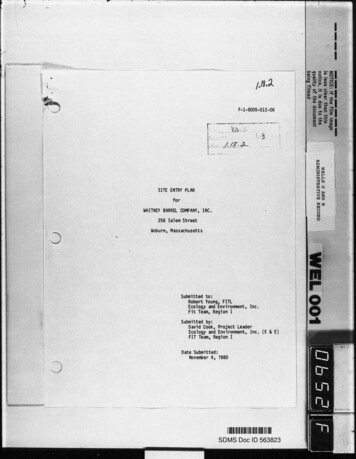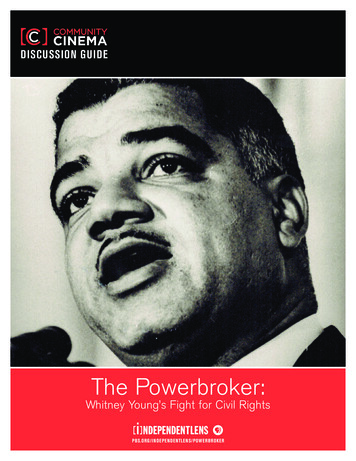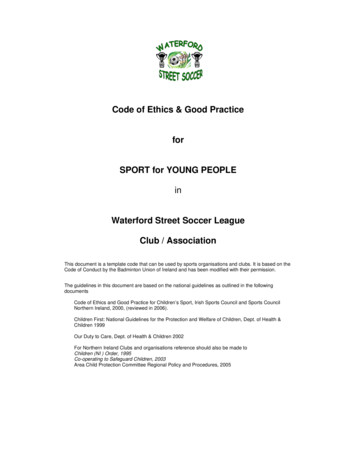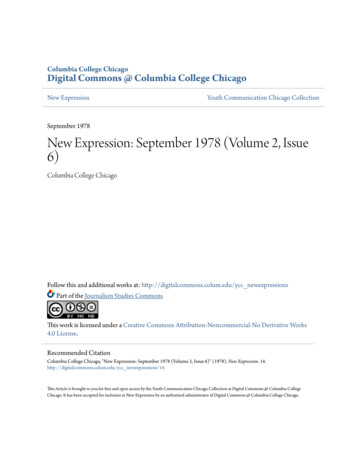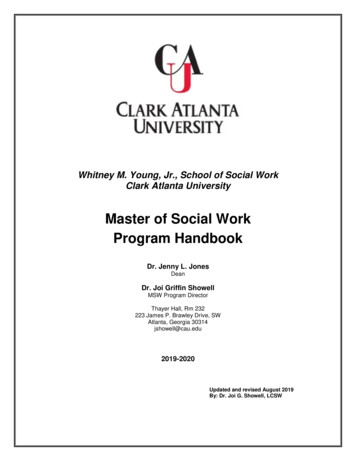
Transcription
Whitney M. Young, Jr., School of Social WorkClark Atlanta UniversityMaster of Social WorkProgram HandbookDr. Jenny L. JonesDeanDr. Joi Griffin ShowellMSW Program DirectorThayer Hall, Rm 232223 James P. Brawley Drive, SWAtlanta, Georgia 30314jshowell@cau.edu2019-2020Updated and revised August 2019By: Dr. Joi G. Showell, LCSW
PrefaceThis handbook is intended to orient students to the Master of Social Work Program (MSW) atClark Atlanta University Whitney M. Young, Jr., School of Social Work. It provides information onthose topics most pertinent to students. Students must read and use this handbook as areference source. Supplements and changes will be provided as they occur.Students participate in policy development, modifications and changes in policies andprocedures that govern the School through involvement on various School committeesand the School of Social Work Student Organization.As you begin your professional education, we encourage you to participate in at least one majorprofessional organization such as: the National Association of Social Workers (NASW); theNational Association of Black Social Workers (NABSW); or the Georgia Society for Clinical SocialWork. Participation in these professional organizations will complement your academic and fieldwork experiences and enhance your professional development.You are joining a profession and a School of Social Work that has a rich history and hasproduced some outstanding social work professionals who have made major contributions to thecommunities and states in which they reside, the nation and the world.The provisions of this Handbook shall not be construed as a legally binding contract between thestudent, the School and the University. The School and University reserve the right to make anddesignate the effective date of changes in School or University policies and other regulations atany time such changes are considered to be appropriate or necessary.1 Page
University AccreditationClark Atlanta University is accredited by the Southern Association of Colleges and Schools Commissionon Colleges to award undergraduate, graduate and professional degrees as well as certificate programs.Contact the Commission on Colleges at 1866 Southern Lane, Decatur, Georgia 30033-4097 or call 404679-4500 Extension 4504for questions about the accreditation of Clark Atlanta University.School of Social Work AccreditationWhitney M. Young, Jr., School of Social Work is accredited by the Council on Social Work Education.Contact The Council on Social Work Education at 1701 Duke Street, Suite 200, Alexandria, VA 22314 orcall 703-683-8080 for questions about the accreditation of Whitney M. Young, Jr., School of Social Work.The provisions of this Handbook shall not be construed as a legally binding contract between the student,the School and the University. The School and University reserve the right to make and designate theeffective date of changes in School or University policies and other regulations at any time such changesare considered to be appropriate or necessary.2 Page
Jenny Jones, MSW, PhD, ACSWDean of the Whitney M. Young, Jr., School of Social WorkGreetings! On behalf of the faculty, and the staff of theWhitney M. Young, Jr. School of Social Work, it is my pleasureto welcome you to Clark Atlanta University. We are glad thatyou have selected Clark Atlanta University, Whitney M. YoungJr., School of Social Work for your social work education.The School of Social Work is the first historically black schoolto be accredited in the world, and the first school of social workto be accredited in the State of Georgia. For close to 100years, Whitney M. Young, Jr., School of Social Work hasmaintained an outstanding reputation for producing competentsocial workers who become leaders in agencies,organizations, communities and universities. To that end, ourgoal is to provide you with a stimulating and enriching learningenvironment, which has been designed to support your development as a professionalsocial worker.This handbook provides information about the Master of Social Work (MSW) Program atthe Whitney M. Young, Jr., School of Social Work, and it is designed to answer basicquestions you may have about Program. The handbook is a useful and essentialresource during your time in the program. The information in this handbook includes thedescription of the MSW program curriculum as well as the School’s relevant policiesand procedures. You will also find that the handbook contains helpful contactinformation for the faculty and staff.I encourage you to become familiar with the information contained in the handbook.More information about the School or the academic policies of the Graduate School andClark Atlanta University may be found by visiting the School of Social Work website atwww.cau.edu. While you are here, I hope your experience in graduate education is arewarding one.Dean and Professor3 Page
Table of ContentsI.OVERVIEW .6II.MSW Program Mission, Vision, Goals and Objectives . . .7MSW Program Mission Statement . 7MSW Program Vision Statement . 7MSW Program Goals. 7MSW Program Objectives 8III.MSW COMPETENCIES AND BEHAVIORS. 9IV.CURRICULUM OVERVIEW AND PLANS OF STUDY. 14Autonomous Social Work Practice Model . 14Humanistic Values . 14The Afrocentric Perspective or Afrocentric Social Work . 14MSW Program Curriculum. .16Foundation Curriculum.16Concentration (Clinical) Curriculum.18Two-Year Plan . 20Three-Year Plan . 20Advanced Standing Plan . 20International Plan. 21V.REQUIRED COURSES & ELECTIVES .26VI.MSW FACULTY AND STAFF . 31VII. ADMISSIONS TO PROGRAM . 36Admission Requirements . 36Admission Process . 36Types of Admissions . 38Admission Status . 38VIII. ADMISSION TO FIELD INSTRUCTION . 40Field Education Placement Process.41IV.TERMINATION FROM MSW PROGRAM . 43Non-Academic Reasons . 43Academic Reasons 44X.MSW PROGRAM GRIEVANCES. . . 45Coursework Grievances and Appeals . . 45Field Education Grievances & Appeals . 46XI. RIGHTS AND RESPONSIBILITIES OF GRADUATE STUDENTS. . 47MSW Student Advisement . 48Expectations of Faculty . 48Expectations of Student . 49Personal Conduct & Use of Social Media . 49CAU Code of Conduct . 494 Page
XII. ACADEMIC STANDARDS . 50Academic Probation . 50Readmission after Termination . 50Transfer of Credits . 50Withdrawals . 51Leave of Absence/Withdrawal . 52Medical Leave of Absence/Withdrawal . 52Readmission After Medical Leave . 52Incomplete Grades . 52Grading Policies for Coursework . 53University Grading System . 53XIII. STUDENT ORGANIZATIONS .56XIV. PROFESSIONAL ORGANIZATIONS . 56XV. Accrediting Bodies . 56XVI. APPENDICES .57Appendix A - NASW Code of Ethics . 57Appendix B - NABSW Code of Ethics . 79Appendix C - School Committees . 80Appendix D - CAU WMYJSSW Non-Discrimination Policy. 81Appendix E - CAU Sexual Harassment Policy . 82Appendix F - CAU Equal Opportunity/Affirmative Action Policy . 83Appendix G - CAU Policy on Drug-Free Environment . 84Appendix H - CAU University Cultural Creed. 855 Page
I. OVERVIEWBrief HistoryClark Atlanta University was formed through the consolidation of Clark College (1865)and Atlanta University (1865) in July 1988. The School of Social Work was founded in1920 and incorporated under the laws of the State of Georgia in 1925. Membership inthe American Association of Schools of Social Work was granted in 1928. When theCouncil on Social Work Education succeeded this accrediting body in 1952, the Schoolbecame a chartered member and has maintained its accreditation since that time. In2000, Clark Atlanta University named the School of Social Work after its first dean, WhitneyM. Young, Jr.The School offers three degree granting programs: the baccalaureate of social workdegree, the master of social work degree, and the doctor of philosophy degree insocial work.The Whitney M. Young, Jr., School of Social Work has the distinction of being the firsthistorically black school of social work in the world. The school expresses through itsmission, program goals and objectives the mandate of Atlanta University’s Motto, “I’llfind a way or make one.” The School’s commitment to prepare students, particularlyAfrican Americans, for careers in the social work profession and as advocates forsocial justice has not wavered since its founding.NASW CODE OF ETHICSCode of Ethics: The National Association of Social Workers has codified a set of standardsregarding professional responsibility to clients, social work colleagues, employing organizations,the social work profession, and society. The Code of Ethics is available . (See Appendix A).6 Page
II. MSW PROGRAM MISSION, VISION, GOALS AND OBJECTIVESThe Whitney M. Young, Jr., School of Social Work (WMYJSSW) Master of Social Work (MSW)program offers a clinical practice degree and prepares social work practitioners with thecompetencies and skills necessary for effective clinical practice in a variety of social work roles.The School’s three educational and integrative themes: Autonomous Social Work PracticeModel; Afrocentric Perspective; and Humanistic Values are incorporated in both the foundationand advanced curriculum.MSW Program Mission StatementThe mission of Whitney M. Young Jr., School of Social Work is to provide and prepare socialwork practitioners as leaders who pursue social justice with a commitment to service withdiverse populations, address disparity issues that prevail globally and engage in competentpractice.MSW Program Vision StatementThe vision of the Master of Social Work Program is to create social work professional programpractitioners with knowledge, values and skills for research, advocacy, and practice to beeffective and culturally competent with a strong impact on diverse global populations.The three mission statements (University, School, and MSW Program) highlight the value ofleadership and diversity. In order to lead, compete, and practice effectively on a local, nationaland global level, MSW students must have an appreciation for human diversity that builds onclients’ strengths and empowerment. Implicit in the mission statement is an appreciation ofhuman diversity, which is reflective of the contextual environment in which the program isembedded. The mission preserves the significance of the profession’s quest for pursuing socialand economic justice for all people, especially those who are oppressed, and seeks to producegraduates who are able to advance the purposes of social work education and address social,economic, and racial disparity issues that prevail on national and global levels.MSW Program Goals1. Prepare graduate students for service in the social work profession as competentadvanced direct social work practitioners.2. Prepare students to apply multiple theoretical frameworks and practice models to workwith client systems of all sizes to resolve complex social issues.3. Prepare students for ethical and culturally competent practice with diverse systems of allsizes, including the ability to utilize an Afrocentric Perspective to resolve complex socialissues and to promote and advocate for social and economic justice.4. Provide students with social work research, knowledge, values, and skills that will enablethem to provide leadership in service delivery systems on a global level.7 Page
5. Prepare students to use technology appropriately to ensure competent and ethicalpractice and provide access to opportunities that enhance their personal andprofessional growth.MSW Program Objectives1. Develop a professional identity as a social worker by applying professional valuesand ethics to direct social work practice.2. Practice with a high degree of autonomy and proficiency at the advanced level bysynthesizing and applying knowledge and skills acquired in the Children and Familiesor Health/Mental Health focus areas.3. Serve as advocates for social justice by applying culturally competent practice withdiverse client systems.4. Use critical thinking skills to analyze, evaluate, and apply research findings topractice, including evaluating ones’ own practice, to effectively practice with, and onbehalf of, diverse populations.5. Use effective intervention models that build on clients’ strengths to address local,national and international social problems.6. Demonstrate the ability to influence social policies that enhance service deliverysystems.7. Practice personal reflection and self-correction to assure continual professionaldevelopment.8. Develop a professional identity as a social worker by participating in social servicenetworks.8 Page
III. MSW COMPETENCIES AND BEHAVIORSCSWE CORE COMPETENCIES AND 2015 EPAS AND PRACTICE BEHAVIORSFoundation Competencies and PracticesCompetency 1: Demonstrate Ethical and Professional Behavior1. Make ethical decisions by applying the standards of the NASW Code of Ethics,relevant laws and regulations, models for ethical decision-making, ethical conduct ofresearch, and additional codes of ethics as appropriate to context;2. Use reflection and self-regulation to manage personal values and maintainprofessionalism in practice situations;3. Demonstrate generalist professional demeanor in behavior; appearance, and oral,written, and electronic communication;4. Use technology ethically and appropriately to facilitate practice outcomes;5. Use supervision and consultation to guide professional judgment and behavior; and6. Tolerate ambiguity in resolving ethical conflicts.Competency 2: Engage Diversity and Difference in Practice1. Apply and communicate understanding of the importance of diversity and difference inshaping life experiences in practice at the micro, mezzo, and macro levels;2. Present themselves as beginning learners and engage clients and constituencies asexperts of their own experiences; and3. Apply self-awareness and self-regulation to manage the influence of personal biasesand values in working with diverse clients and constituencies.Competency 3: Advance Human Rights and Social, Economic, and EnvironmentalJustice1. Apply understanding of social, economic, and environmental justice to advocate forhuman rights at the individual and system levels at a beginning generalist level;2. Engage in practices that advance social, economic, and environmental justice at abeginning generalist level; and3. Recognize the extent to which culture, structure, and values may oppress, marginalize,alienate, or create or enhance privilege and power.Competency 4: Engage in Practice-informed Research and Research-informedPractice1. Use practice experience to inform scientific practice;2. Apply critical thinking to engage in analysis of quantitative and qualitative researchmethods and research findings; and3. Use and translate research evidence to inform and improve practice, policy, andservice delivery.9 Page
Competency 5: Engage in Policy Practice1. Identify social policy at the local, state, and federal level that impacts well-being,service delivery, and access to social services;2. Assess how social welfare and economic policies impact the delivery of and access tosocial services; and3. Apply critical thinking to analyze, formulate, and advocate for policies that advancehuman rights and social, economic, and environmental justice.Competency 6: Engage with Individuals, Families, Groups, Organizations, andCommunities1. Apply knowledge of human behavior and the social environment, and othermultidisciplinary theoretical frameworks to engage with clients and constituencies atthe generalist level; and2. Use empathy, personal reflection and interpersonal skills to effectively engage diverseclients and constituencies at the generalist level.Competency 7: Assess Individuals, Families, Groups, Organizations andCommunities1. Collect and organize data, and apply critical thinking to interpret information fromclients and constituencies;2. Apply knowledge of human behavior and the social environment, person-inenvironment, and other multidisciplinary theoretical frameworks in the analysis ofassessment data from clients and constituencies;3. Develop mutually agreed on intervention goals and objectives based on the criticalassessment of strengths, needs and challenges within clients and constituencies; and4. Select appropriate intervention strategies based on the assessment, researchknowledge, values and preferences of clients and constituencies.Competency 8: Intervene with Individuals, Families, Groups, Organizations andCommunities1. Critically choose and implement interventions to achieve practice goals and enhancecapacities of clients and constituencies;2. Apply knowledge of human behavior and the social environment, person-inenvironment, and other multidisciplinary theoretical frameworks in interventions withclients and constituencies;3. Use inter-professional collaboration as appropriate to achieve beneficial practiceoutcomes;4. Negotiate, mediate, and advocate with and on behalf of diverse clients andconstituencies; and5. Facilitate effective transitions and endings that advance mutually agreed-on goals.10 P a g e
Competency 9: Evaluate Practice with Individuals, Families, Groups,Organizations and Communities1. Select and use appropriate methods for evaluation of outcomes;2. Apply knowledge of human behavior and the social environment, person-inenvironment, and other multidisciplinary theoretical frameworks in the evaluation ofoutcomes;3. Critically analyze, monitor, and evaluate intervention and program processes andoutcomes; and4. Apply evaluation findings to improve practice effectiveness at the micro, mezzo andmacro levels.School Competency 10: Demonstrate knowledge of the Afrocentric Perspectivewith individuals, Families, Groups, Organization, and Communities1. Identify and describe the concepts of the Afrocentric Perspective.2. Apply and communicate an understanding of the importance of Afrocentric Perspectivein practice at the micro, mezzo, and macro levels.WMYJSSW Concentration Competencies and Practice BehaviorsCompetency 1: Demonstrate Ethical and Professional Behavior1. Employ strategies of ethical reasoning to address the use of technology in clinicalpractice and its effect on client rights;2. Identify and use knowledge of relationship dynamics, including power differentials;3. Recognize and manage personal biases as they affect the professional relationship inthe service of the client system’s well- being;4. Apply the NASW Code of Ethics, relevant laws, and regulations, ethical decisionmaking principles and frameworks to issues specific to micro social work practice.Competency 2: Engage Diversity and Difference in Practice1. Identify and use practitioner/client differences from a strengths perspective;2. Demonstrate awareness of historical and contemporary forms of privilege, power,oppression, discrimination, and marginalization and their impact on clients; and3. Engage clients as experts in their own experiences.Competency 3: Advance Human Rights and Social, Economic, and EnvironmentalJustice1. Use knowledge of the effects of oppression, structural discrimination, and historicaltrauma on client and client systems to guide treatment planning and intervention; and2. Advocate of behalf of clients to secure basic human rights, including availability andaccessibility of services to meet biopsychosocial needs.11 P a g e
Competency 4: Engage in Practice-Informed Research and Research-informedPractice1. Use the evidence-based practice process in clinical assessment and intervention withclients;2. Participate in the generation of new clinical knowledge, through research and practice;and3. Use research methodology to evaluate clinical practice effectiveness and/or outcomes.Competency 5: Engage in Policy Practice1. Communicate to stakeholders the implication of policies and policy change in the livesof clients;2. Use evidence-based practice and practice-based evidence in advocacy for policiesthat advance social and economic well-being; and3. Advocate with and inform administrators and/or legislators of policies used by theagency that impact clients and services.Competency 6: Engage With Individuals, Families, Groups, Organizations andCommunities1. Develop a culturally responsive clinical relationship;2. Attend to the interpersonal dynamics and contextual factors that both strengthen andpotentially threaten the therapeutic alliance; and3. Establish a relationally based process that encourages clients to be equal participantsin the establishment of treatment goals and expected outcomes.Competency 7: Asses Individuals, Families, Groups, Organizations andCommunities1. Use multidimensional biopsychosocial-spiritual assessment tools;2. Assess client’ and systems’ readiness for change;3. Assess client coping strategies to reinforce and improve adaptation to life situations,circumstances, and events;4. Select and modify appropriate intervention strategies based on continuous clinicalassessment; and5. Assess biopsychosocial needs and diagnose psychopathology using DSM-5 and otherrelevant assessment protocols.Competency 8: Intervene with Individuals, Families, Groups, Organizations andCommunities1. Critically select, evaluate, and apply best practices and evidence-based interventions;2. Demonstrate the use of appropriate clinical techniques for a range of presentingconcerns identified in the assessment; and3. Collaborate with other professionals to coordinate treatment interventions.12 P a g e
Competency 9: Evaluate Practice with Individuals, Families, Groups,Organizations and Communities at the Advanced Level1. Apply the theoretical knowledge base of the social work profession thorough practicebased research.2. Apply clinical evaluation of the process and outcomes to develop best practiceinterventions for a range of bio-psycho-social-spiritual conditions.3. Communicate evaluation results to the appropriate audience: clients, co-workers,supervisors, administrators.School Competency 10: Apply The Concepts Of The Afrocentric Perspective InAdvanced Direct Practice With Individuals, Families, Couples, Groups1. Select the core concept(s) of Afrocentric Perspective appropriately for clinical socialwork practice with individuals, families, groups, organizations, and communities.2. Apply to engagement of clients;3. Apply to assessment of clients;4. Apply to intervention of clients; and5. Apply to evaluation of clients.13 P a g e
IV. CURRICULUM OVERVIEW AND PLANS OF STUDYThe MSW Program’s curriculum is shaped by three integrative themes: Autonomous SocialWork Practice; Humanistic Values; and the Afrocentric Perspective. These three themes usethe strengths perspective as an organizing framework. Students are introduced to thesethemes and organizing framework in the first semester of study and they are incorporatedthroughout the curriculum.Autonomous Social Work Practice ModelThe MSW Program defines Autonomous Social Work practice as a practice model that enablesthe practitioner to become an autonomous, self-reflective social worker, and to develop skills toevaluate one’s own practice. The Autonomous Social Work Practice Model introduces MSWstudents to the various social work practice change agent roles essential for practice and servesas the base for utilizing practice theory, teaching practice roles, and acquiring competent skills.Humanistic ValuesHumanistic values reflect the second theme embedded within the MSW curriculum andconceptual framework. Humanistic values reflect the MSW Program’s beliefs about the worthand dignity of all human beings and the ultimate hope that each individual will be able todevelop to his/her maximum potential. It is the belief of the Whitney M. Young, Jr., School ofSocial Work that humanistic values lead to more humane practice in professional social work.The humanistic values perspective incorporates the following principles: Love (agape) is essential to collective human development; All people are created with equal ability and potential (barring pre and post-natal stress); All human beings have the inherent right to dignity, respect, and personal confidentiality; The satisfaction of basic human needs is a primary responsibility of society and must bethe basis upon which society distributes its resources; Perceptions and life experiences of all human beings have value for them; All human beings must have the right to significantly influence the decisions that affecttheir lives, and Cooperation as opposed to competition is a requisite for developing humancommunities.14 P a g e
THE AFROCENTRIC PERSPECTIVE OR AFROCENTRIC SOCIAL WORK(Prepared by Dr. Jerome Schiele, July 14, 2016)The Afrocentric Perspective or Afrocentric social work is a practice-based model that affirms,codifies, and integrates common cultural experiences, values, and interpretations that cutacross people of African descent.
This handbook is intended to orient students to the Master of Social Work Program (MSW) at Clark Atlanta University Whitney M. Young, Jr., School of Social Work. It provides information on those topics most pertinent to students. Students must read and use this handbook as a reference source. Supplements and changes will be provided as they occur.
